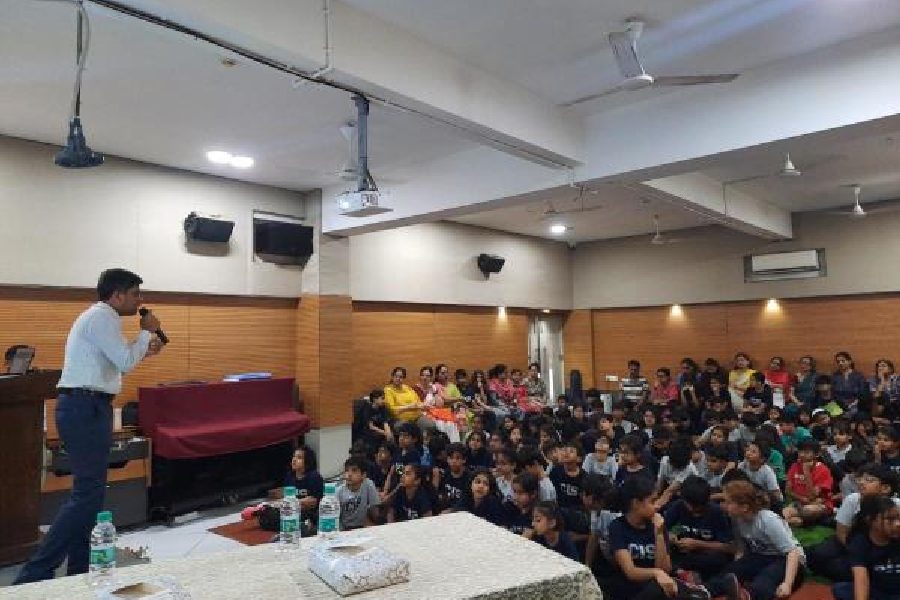• Do not open a link or an attachment sent by someone you don’t know. It may contain a virus that can compromise your device.
• Don’t share passwords with anyone, not even your closest friends.
• Do not post personal pictures online.
• For booking hotels or air tickets, ask your parents to choose a reliable website.
Officers from the cybercrime police station in Lalbazar conducted a session on cyber safety with students in the primary section of a school, most of whom have access to devices, at times for prolonged periods without any adult supervision.
Across schools, children from Class II or III use the online platform and they need to be told about the dangers of being online or making friends online indiscriminately, said teachers.
Calcutta International School had invited officers from Kolkata police’s cybercrime police station to conduct a session with the students of Classes III, IV and V. The session was held on the school premises on Friday.
“We are aware of the extensive use of devices by our learners from Grade III onwards. Some of our students, during a conversation with teachers or counsellors, have opened up and said that despite being underage, they have social media profiles through fake accounts. They need to be made aware of the consequences of their actions,” said Pratima Nayar, principal, junior school, Calcutta International School.
During the session, students said they have hundreds of friends online, many of whom they do not know personally or have not met in real life.
Some students said they play online games for hours at a stretch.
“We have to accept and own that we have another life online and we have access to an iPad, a phone, a computer. We all have some activity online, whether chatting with friends or accessing websites,” psychotherapist Farishta Dastur Mukerji, who is a counsellor at Calcutta International School, told the students.
“The use of gadgets will only increase and half-knowledge can be dangerous. It is important that we embrace technology while being aware of the perils.”
A police officer said while addressing the students: “If your parents drive a car on a highway, they have to follow some rules. Similarly, one has to follow certain rules while being involved in online activities.”
The session was conducted by Kuntal Sidhartha, Raja Saha and Suraiya Sultana,
all officers from the cybercrime police station at the city police headquarters in Lalbazar.
The officers told the children that there should be a prescribed time for being online and warned the students against posting personal pictures on social media platforms randomly.
“Children post pictures which give away their personal details, such as which school they study in, where they live and how they commute. Children do not customise their settings and hence, such details are public. And that makes them vulnerable,” said one of the officers who conducted the session.
“They (cyber criminals) try to trap us. So you have to follow the rules and you should take it as a challenge not to be trapped,” another officer said.
While a student can fall victim to cybercrime, he or she can also end up doing something inappropriate, which might make them face investigation under the Juvenile Justice Act, said an officer.
Nayar, of Calcutta International School, said the purpose of having such sessions regularly is to reinforce the importance of following the guidelines issued by the cybercrime unit of the city police.
“If you are creating fake accounts, you are leaving a footprint. The students need to be made aware of the fact that they may be minors, but they are still being watched and there could be consequences which have legal implications. It is important to make
kids realise that whatever they do, if it comes within the purview of cybercrime, there will be an investigation,” said Nayar.
